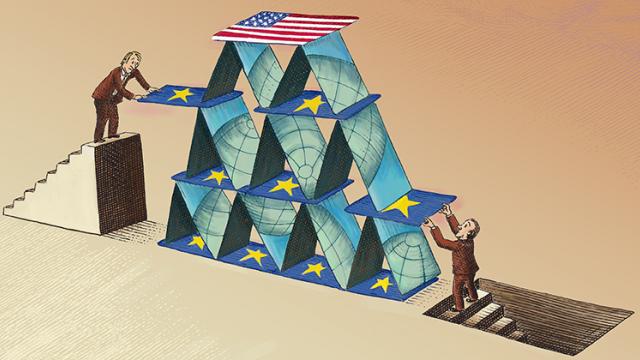
I must congratulate the U.K. citizens for voting to leave the undemocratic, unaccountable, bureaucratic and failed experiment that is the European Union. The euro is barely 17 years old and has been experiencing a multi-year debt crisis since 2009. Already many countries within the Eurozone, such as Ireland, Greece, Portugal and Spain, are experiencing record levels of unemployment. The only cure, according to the bankers and Eurocrats, is an austerity regime that privatizes water and other crucial public utilities, cuts pensions and social security benefits, increases the work day, reduces wages, and takes out loans from the IMF – accruing staggering levels of debt that many Eurozone countries will never be able to pay back.
Yes, I wholeheartedly support the Brexit vote as an American. And no, I am not an anti-immigrant racist.
There have been a lot of accusations aimed at the “Leave” camp that their decision was largely driven by anti-immigrant rhetoric and racism. However, the significance of this historic vote lies not with the small majority of “Leave” voters who were motivated by immigration fears, but rather the gambit it represents toward direct democracy and populist movements. The vote exemplifies a broader rejection of unelected political power and neoliberalism.
Almost immediately after the Brexit vote, countries such as the Netherlands, France, Denmark and Italy demanded referendums to determine their ongoing participation in the European political project. The Left Leave campaign in the U.K. has a great videoexplaining how the E.U. is not just undemocratic: it is anti-democratic.
The divisions were relatively clear in the vote. The majority of London, Northern Ireland and Scotland voted to remain part of the E.U., while the rest of the country, in all other regions, voted overwhelmingly to leave. These regions voted not out of hate, but out of resentment toward austerity measures that have demolished middle and working class families. They voted to Leave because they feel the European Union isn't working for them.
Let's take a current example: the Transatlantic Trade and Investment Partnership. Unaccountable political institutions like the E.U. have been instrumental in crafting and instituting sweeping legislation, including trade deals, that provide avenues for unfettered corporate power. The current negotiations of TTIP are, like their counterpart, the Trans-Pacific Partnership, being discussed behind the closed doors. The E.U. has allowed governments to form unelected bodies that negotiate privately with special interests while keeping information from the public. If the U.K. sent Members of Parliament instead of using European Commissioners for the task, more information would be revealed to the public and a true referendum on TTIP could be carried out. The same is true with the negotiations of the TPP.
(Note: If EU members are concerned about a scuttling of the TTIP due to Brexit, breathe easy: an E.U. commissioner recently calmed fears that the vote would somehow derail instituting the behemoth corporate trade agreement.
More accurately, the Brexit vote has dealt a huge blow to international central banks, and globalization in general. The E.U. has largely operated as a political tool to exercise the will of globalist central banks such as the European Central Bank, the IMF and the World Bank. These banks have placed the citizens of the European Union into financial servitude through the imposition of harsh, undemocratic austerity measures forced upon countries that had little choice but to accept them.
Another popular approach of these global financial bodies is to replace nations' democratically elected officials with leaders that have previously worked in high finance – ensuring almost complete cooperation with their goals. For instance, in Greece, the democratically elected George Papandreou stepped down and was replaced by Lucas Papademos, former VP of the European Central Bank. In Italy, following the resignation of the corrupt media mogul and Prime Minister Silvio Berlusconi, Mario Monti, a former European commissioner and senior adviser at Goldman Sachs, was undemocratically sworn in as the new PM. In Britain, at least, the people have shown they've had enough: They are tired of technocrats running their governments and want a more direct say in their affairs. “The general public [is] disgusted with the politicians that are running their country and robbing them of their future,” said Gerald Celente of the Trends Research Institute.
The establishment, through countless articles, media forums and speeches by global figureheads, tried to discredit the “Leave” campaign by pumping out its own rhetoric of fear and mistruths: Leaving the European Union spells disaster. It will affect trade. They’re a bunch of racists. They hate refugees.
Now, the globalist banks and hedge fund managers are scrambling to compensate for the losses on their bets that the U.K. would remain. More than $2 trillion was wiped from global stocks and the pound was knocked to a 31-year low. The banks, and investors, are sending a message: trying to make an example of the U.K. so that no other country gets the crazy idea to have a similar referendum.
The “Remain” camp claimed that by staying in the E.U. they could fix the body's problems from the inside. But for many – and particularly those who voted "Leave" – the true solutions to today's political and economic crises must take place outside the political establishment, in the realm of populist movements. A vote to Leave the E.U. is a vote for that approach. The vast majority of our political institutions are illegitimate by at least one standard: They are flooded with dark money that represents special interests, and are led by individuals who represent those special interests, rather than the public's. Why do people continue to follow these institutions and naively think that they can change them so that they exercise the public's will?
The global statement made by Brexit was loud and clear: It's time to regain local, regional and national sovereignty in order to implement direct democracy and restore power to everyday people. Let the people vote on issues that affect them, rather than remain controlled and bound by a handful of technocrats representing the global financial elite. If neighboring countries aren't clear about that takeaway, maybe they could try holding their own E.U. referendum and see what happens. They might be surprised.
3 WAYS TO SHOW YOUR SUPPORT
- Log in to post comments












